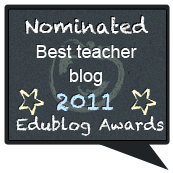Photo source: http://www.pinterest.com/ucylibrary/bookish-humor/
I’ve been thinking lately how my blog writing style has changed over time. Reading post archives while searching for something, I realised how informal, loose and reflective my earlier posts were. Now I feel internal pressure to wait until I have something substantial to write about, and that happens infrequently. I often feel that there is nothing I can say better than those who have written before me. I might have to work through that – after all, a blog post is not supposed to be an academic article. Can anyone else relate to this?
So, today is the first day of second term, and the Melbourne High School staff attended a curriculum day with faculty-related staff from the City Edge schools which included the Mac.Robertson Girls’ High School, Melbourne Girls’ College, University High School, Victorian College of the Arts Secondary School, Albert Park College, Princes Hill Secondary College and us. Library staff (as well as Maths staff) met at University High School.
It was an enjoyable and valuable day, and I thank the principals for organising this opportunity. It makes so much sense to come together and share stories and ideas, to take time out for ourselves and get to know each other. Our session was relaxed and informative. I loved meeting everyone and taking in the diverse personalities and talents. There were a few short presentations, including mine on my use of Pinterest, one from Melbourne Girls’ College about their recent reading initiative and also from Andrew Finegan who has recently taken up the position as head of library at VCASS. After morning tea we decided not to split up into teams of teacher librarians and technicians, and I thought that worked very well. We fit comfortably into a space which was both open and intimate, and we shared and discussed library-related issues ranging from practical aspects, such as security, to controversial issues, such as the relevance of non-fiction in a contemporary school library and the changing nature of information access. I thought that everyone spoke honestly, and that we felt supported by the larger network which understood shared experiences. We are fortunate to have this opportunity, especially since professional development days are usually packed with guest speakers and intensive sessions with little time to socialise.
Later in the afternoon we were treated to a visit from Mike Shuttleworth, Program Manager at Melbourne Writers Festival, who predictably spoke about the Melbourne Writers Festival program and authors. Not really a talk but more of a conversation. Mike was interested in learning from us how we select authors for school visits, how many of us had attended previous festivals, and our feedback from these events. Again, I was grateful for this informal, interactive session – so much more valuable than formal talks which place us as passive recipients. The afternoon ended with several people sharing books they had recently read and enjoyed. Mike shared with us a book by Carol Ann Duffy called 1914: Poetry remembers.
To mark the centenary of the First World War in 2014, the Poet Laureate, Carol Ann Duffy, has engaged the most eminent poets of the present to choose the writing from the Great War that touched them most profoundly: their choices are here in this powerful and moving assembly. But this anthology is more than a record of war writing. Carol Ann Duffy has commissioned these same poets of the present to look back across the past and write a poem of their own in response to the war to end all wars.
We thought that we might organise a poetry competition for students to do something similar.
Oh, and did I mention that it was a very wet and miserable day? What has happened to the beautiful, quiet Autumn sun? And so it’s back to business as usual tomorrow. Never mind – public holiday on Friday for ANZAC Day.
Big thanks to Rob Castles and his team at Uni High for welcoming us into their spaces and organising such a great day.









 Photo from
Photo from 



